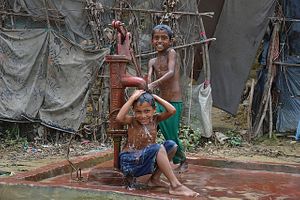Bangladesh is dealing with the worst refugee crisis in its 46-year history. The Rohingya people, natives of the Rakhine state on Myanmar’s western coast, have begun a mass exodus out of Myanmar and into neighboring Bangladesh. Driven from their homes by the government of Myanmar, which considers many of them to be anti-government insurgents, they have few options. Bangladesh is the nearest haven available to them.
Most people think Bangladesh is among the least-equipped nations to handle such a vast and expensive problem. After all, the South Asian nation of more than 160 million people was infamously called a “basket case” in the 1970s by then-U.S. Secretary of State Henry Kissinger.
In fact, Bangladesh has a rapidly growing economy that in 2015 moved up into the lower-middle income bracket as measured by the World Bank. Between 2008 and 2016, more than 30 million Bangladeshis escaped poverty’s grip and the number of poor, homeless and displaced citizens continues to decrease every year.
Assisting hundreds of thousands of refugees is a burden, of course. But Bangladesh is proud to bear the bulk of the cost of helping the Rohingya.
Bangladesh has its own history with genocide and refugee status. During its 1971 Liberation War, the Pakistani army and its Bangladeshi collaborators undertook a genocide that killed 3 million people. Members of the Pakistani military and supporting Islamist militias raped 250,000 women and girls. They displaced 40 million others, 10 million of whom took refuge in India.
Before Bangladesh achieved independence, Pakistan treated residents of East Pakistan – the area that is now Bangladesh – as second-class citizens. Their actions were cruel and calculated. For example, the government intentionally delayed aid to the Bengali people after a 1970 cyclone that killed 500,000 Bengalis. The Pakistan government even suspended parliament rather than seat a prime minister from East Pakistan.
In other words, Bangladesh understands the plight of the Rohingyas too well. When Bengalis desperately needed assistance a half century ago, India responded by taking in millions of refugees. Bangladesh is eager to extend the same helping hand to the Rohingyas.
Even before the most recent exodus began in August, 400,000 Rohingyas had already immigrated to Bangladesh. Since then, Bangladesh has absorbed as many as 420,000 more Rohingya refugees. This number grows by the day as Myanmar’s military continues to drive Rohingyas out of their homes.
As a result, Bangladesh has had to buttress its efforts to protect the Rohingya. In addition to the two existing refugee camps in the southern city of Cox’s Bazaar, Bangladesh has made an additional 2,000 acres of land available. Bangladesh has begun issuing identification cards to the Rohingya and providing them with access to government services, including childhood immunizations. Bangladesh is also constructing sturdy shelters to house the most vulnerable and handing out hot meals.
Earlier this month, Bangladesh Prime Minister Sheikh Hasina visited the Kutupalong refugee camp and promised to help the Rohingyas: “We gave them [the Rohingya refugees] shelter in our country on humanitarian grounds. Our houses were also burnt down in 1971. Our people fled to India when they had nowhere to go. So, we are doing everything in our power to help the Rohingya.”
Life in a refugee camp is far from ideal. Neither the newly allocated land nor the pre-existing settlements can house the Rohingya for an extended period. Local officials lack the manpower and resources to manage all the humanitarian challenges that hosting a large refugee population brings. Also, the Bangladesh government fears that the flood of refugees will conceal and even aid a far bigger menace – an influx of Islamist terrorists who enter the country disguised as refugees.
Bangladesh is not asking for international assistance for the Rohingyas. We can bear that burden alone. It is no longer a poor country. But Bangladesh and the Rohingya need the U.S. and India to use their substantial authority to pressure Myanmar to stop driving the Rohingya out. Aung Sang Suu Kyi’s government and the military junta must be compelled to act.
So far, Myanmar has ignored pleas to end the violence and to allow Rohingyas to live as full citizens in their home country. In the meantime, Bangladesh is proudly willing and able to help them as refugees. E
Sajeeb Wazed is chief information and communications technology adviser to the government of Bangladesh and the son of the prime minister.

































